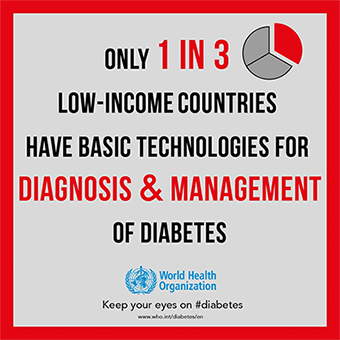
3.Diabetes-related Social Functioning Worse in Middle, |

![]() World Health Survey data concludes that adults with diabetes living in middle- and low-income countries experience impaired social functioning to a greater degree than those living in high-income countries.
World Health Survey data concludes that adults with diabetes living in middle- and low-income countries experience impaired social functioning to a greater degree than those living in high-income countries.
![]() As healthcare systems in middle- and low-income countries have only fewer resources to reduce the potential social impact of diabetes, researchers performed a comparative study on the diabetes-social impairment link in low-, middle- and high-income countries. Adrian Loerbroks, PhD, MSc, MHS, of the Institute of Occupational, Social and Environmental Medicine, University of Dusseldorf, Germany and colleagues analyzed data from the cross-sectional World Health Survey, carried out in 2002-2003 in 70 countries across Africa, Asia, Australia, Europe and South America.
As healthcare systems in middle- and low-income countries have only fewer resources to reduce the potential social impact of diabetes, researchers performed a comparative study on the diabetes-social impairment link in low-, middle- and high-income countries. Adrian Loerbroks, PhD, MSc, MHS, of the Institute of Occupational, Social and Environmental Medicine, University of Dusseldorf, Germany and colleagues analyzed data from the cross-sectional World Health Survey, carried out in 2002-2003 in 70 countries across Africa, Asia, Australia, Europe and South America.
![]() In this study, researchers assessed national samples from 48 of the surveyed countries and stratified nations by income level: 10 low-income countries (n = 44,285), 15 lower-middle-income countries (n = 81,573), 14 upper-middle-income countries (n = 91,307) and nine high-income countries (n = 18,263). Diabetes was self-reported by participants completing questionnaires; social functioning was measured using a module that assessed limitations in eight different life domains, including mobility, self-care, pain/discomfort, etc. Potential diabetes-related impairments, including impairments in vision, mood etc. were also measured. Researchers estimated the odds ratios (OR) for the association between reports of diagnosed diabetes and impaired social functioning.
In this study, researchers assessed national samples from 48 of the surveyed countries and stratified nations by income level: 10 low-income countries (n = 44,285), 15 lower-middle-income countries (n = 81,573), 14 upper-middle-income countries (n = 91,307) and nine high-income countries (n = 18,263). Diabetes was self-reported by participants completing questionnaires; social functioning was measured using a module that assessed limitations in eight different life domains, including mobility, self-care, pain/discomfort, etc. Potential diabetes-related impairments, including impairments in vision, mood etc. were also measured. Researchers estimated the odds ratios (OR) for the association between reports of diagnosed diabetes and impaired social functioning.
![]() The overall sample included mostly middle-aged adults. Across countries, 3.5% reported a diagnosis of diabetes and 14.6% had obesity, whereas 11.4% reported problems with mood, cognition and mobility. Poor social functioning and vision problems were less prevalent (6.8% and 8%, respectively). At the same time, the prevalence of diabetes, obesity and mobility increased with country income levels.
The overall sample included mostly middle-aged adults. Across countries, 3.5% reported a diagnosis of diabetes and 14.6% had obesity, whereas 11.4% reported problems with mood, cognition and mobility. Poor social functioning and vision problems were less prevalent (6.8% and 8%, respectively). At the same time, the prevalence of diabetes, obesity and mobility increased with country income levels.
![]() Investigators confirmed an association between self-reported diabetes and impaired social functioning (OR = 1.47, 95% CI = 1.18-1.83). The strength of that relationship increased with decreasing country income (e.g. OR in low-income countries = 2.23, 95% CI = 1.14-4.37). Associations were substantially attenuated by further correction for impairments, in particular, mood problems, in the overall sample (OR = 0.92, 95% CI = 0.72-1.16) and all income regions.
Investigators confirmed an association between self-reported diabetes and impaired social functioning (OR = 1.47, 95% CI = 1.18-1.83). The strength of that relationship increased with decreasing country income (e.g. OR in low-income countries = 2.23, 95% CI = 1.14-4.37). Associations were substantially attenuated by further correction for impairments, in particular, mood problems, in the overall sample (OR = 0.92, 95% CI = 0.72-1.16) and all income regions.
![]() The study thus showed that self-reported diabetes is associated with impaired social functioning in high- and middle-income countries, and the relationship is even stronger in low-income countries. Associations are largely explained by physical and mental impairments, which may be due to diabetes.
The study thus showed that self-reported diabetes is associated with impaired social functioning in high- and middle-income countries, and the relationship is even stronger in low-income countries. Associations are largely explained by physical and mental impairments, which may be due to diabetes.
![]() According to Loerbroks, the observations further highlight the importance of directing scarce health care resources to the adequate management of diabetes, especially within low-income settings. “Such efforts will not only help to prevent complications, but may also reduce the impact of diabetes on the social functioning and participation of patients,” he said.
According to Loerbroks, the observations further highlight the importance of directing scarce health care resources to the adequate management of diabetes, especially within low-income settings. “Such efforts will not only help to prevent complications, but may also reduce the impact of diabetes on the social functioning and participation of patients,” he said.
For enquiries info@jothydev.net.
Please visit: jothydev.net | research.jothydev.com | diabscreenkerala.net | jothydev.com/newsletter
